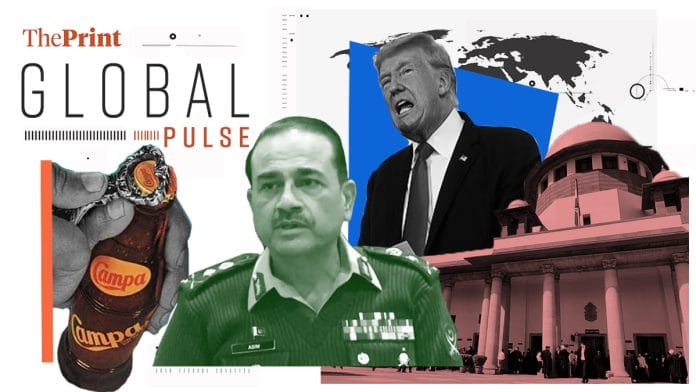New Delhi: Pakistan Army chief Asim Munir has stepped into the spotlight—a marked deviation from the usual persona of his predecessors—by shaping national policy and rhetoric in the wake of the Pahalgam terror attack that left 26 dead, reports Salman Masood in The New York Times.
“General Munir’s response appears to be more than a political calculation. Analysts describe him as a hard-liner on India, with views shaped by his time leading Pakistan’s two premier military intelligence agencies and by his belief that the long-running conflict with India is at heart a religious one,” says the profile.
Meanwhile, just over a hundred days after coming to power, US President Donald Trump has overhauled a number of policies which the world took for granted. And Indians have been directly impacted.
The US has about 3 lakh Indian students studying in its universities, and 1 lakh workers employed through the Optional Practical Training (OPT) programme. Half of the 327 visa revocation cases have targeted Indians, reports Karishma Mehrotra in The Washington Post.
“Many who came to study and stayed to work now wonder if they have a future here,” the report says.
“It is still a lot of chaos,” an engineer, who lost his job when he lost his immigration status, told The Post. “Every day is a nightmare.”
The Post doesn’t shift its focus from Kashmir either. Via an Associated Press report, Sheikh Aliq looks at where both India and Pakistan are positioned, as the nations “scramble” to collect resources in the wake of conflict.
“Meanwhile, both nations have launched an aggressive diplomatic campaign to shore up support for their positions. India has made efforts to highlight what it called the ‘cross-border link’ to the attack by briefing diplomats of dozens of countries,” it reads.
In an interesting turn of events, India’s Ministry of Culture is attempting to halt the auction of ancient gem relics in Hong Kong, claiming that it should be treated as the body of the Buddha, says a report in The Guardian.
In a letter shared on Instagram, the ministry has insisted on the immediate cessation of the auction, saying the gem relics “constitute inalienable religious and cultural heritage of India and the global Buddhist community”.
India has also demanded an apology from Sotheby’s and director Chris Peppe, one of the owners of the relics.
Back in India, the Supreme Court has intervened in JSW Steel’s buyout of Bhushan Power & Steel. The acquisition was supposedly mired with “an entire spectrum of lacunae and flaws”, writes Veena Venugopal in The Financial Times.
“The judgment sets a troubling precedent, casting the shadow of future liquidation on all acquisitions. With the risk that entire deals could be voided even years after being sealed, companies will, at the very least, have second thoughts about making investment decisions,” she says.
The Ambanis’ revival of Campa Cola has been successful to the point where it risks edging out rivals Coke and Pepsi, reports Satviki Sanjay for Bloomberg.
“The refineries-to-retail conglomerate is known for upending any sector it enters, mostly by crashing prices and driving competition out,” the report states––adding that competitors have been forced to “cut prices, introduce new variants and shore up retail networks.”
(Edited by Zinnia Ray Chaudhuri)
Also read: No appetite for war among Pakistan’s citizens while India ‘quietly lobbies’ for support at UN






